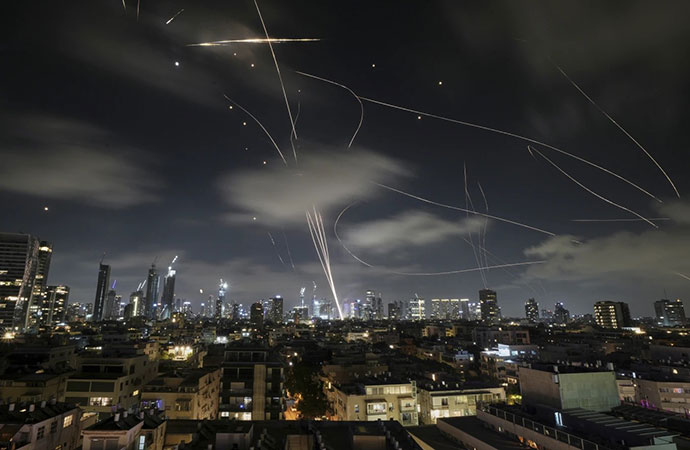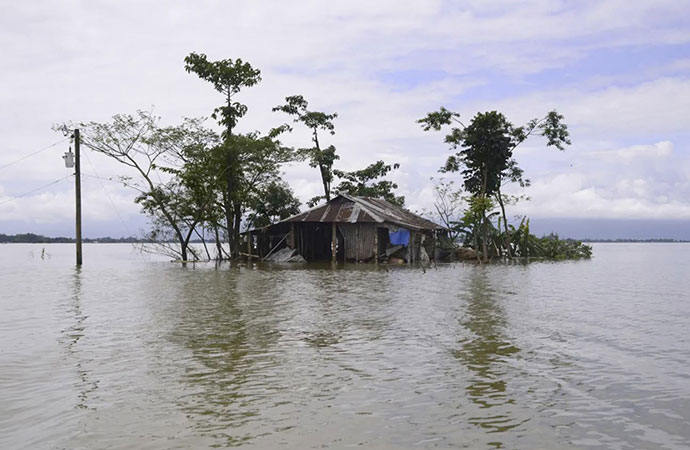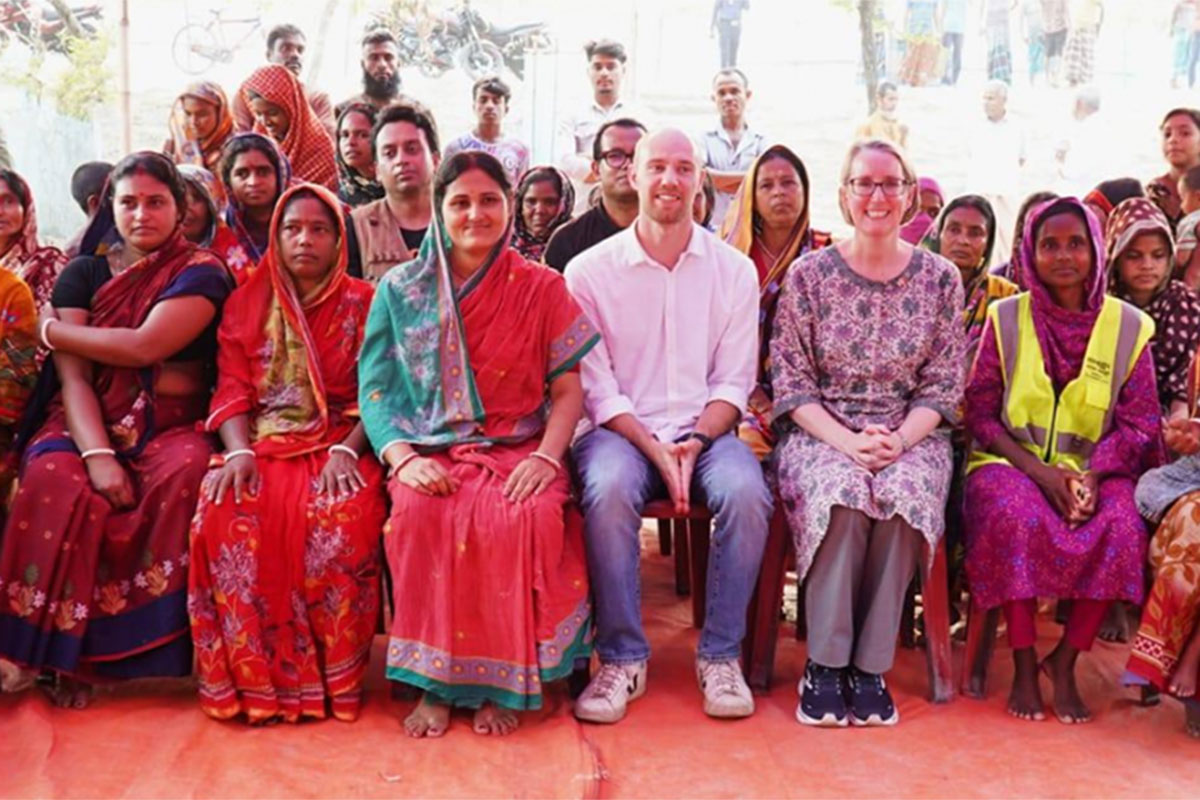Column

Iranian missiles strike Tel Aviv, Israel. Photo: AP/UNB
Let your plans be dark and impenetrable as night, and when you move, fall like a thunderbolt.
- Sun Tzu
Each morning over the breakfast table, it is customary for intelligence chiefs to brief the sitting head of government on pressing matters of national security. In Bangladesh, the heads of DGFI and NSI are usually responsible for briefing the President, Prime Minister or Chief Adviser. This role can be reinforced by the newly created position of National Security Adviser who can represent the broad spectrum of intelligence gathering.
In May, Bangladesh's Chief Adviser told his cabinet that the country was facing a war-like situation. His comment raised eyebrows. War eventually broke out on 13 June between Israel and Iran after the Jewish State launched a surprise attack on the Islamic Republic. The residence of a Bangladeshi diplomat in Tehran was also destroyed during an Israeli air strike. Iran's threat to close the Strait of Hormuz sent jitters across the global economy, including in Bangladesh which imports most of its crude oil from the Gulf states. Oil prices began to spike.
The Israeli blitzkrieg began in the early hours of 13 June when stealth fighters rained down bombs across Iranian cities, including the capital Tehran. In the first wave of attacks, Israel eliminated key elements of Iran's leadership, including the Chief of Staff of the military, leaders of the powerful Islamic Revolutionary Guard Corps, and many nuclear scientists. Israel achieved air supremacy over much of western Iran. Iran has relied on missiles as its sole method of retaliation as much of the Iranian Air Force has been grounded or damaged. "A country without a strong air force is at the mercy of an aggressor", said Muhammad Ali Jinnah once.
The Islamic Republic retaliated with the largest missile attack on Israel ever seen, outdoing earlier Iranian salvos, Hamas, Hezbollah and Houthi rocket attacks, and Saddam Hussein's scud missile attacks on the Jewish State during the Gulf War. The risk of an escalation spiraling into a regional war is significant, including the potential for Iran to strike at energy and military infrastructure in Gulf states. Iran has already warned Qatar of its ability to hit U.S. bases.
Israel has mounted the largest attack on Iran since the Iran-Iraq War during the 1980s. At the time, Bangladesh convened an OIC Foreign Ministers meeting in Dhaka in 1983 which called on Muslim nations "to act collectively to end the Iran-Iraq war". Dhaka's response to the latest outbreak of war was to unequivocally condemn "Israeli military attacks against the Islamic Republic of Iran", which the Foreign Ministry considers to be violations of the UN Charter, fundamental principles of international law, and the sovereignty of Iran. Dhaka urged the UN and international community "to act collectively in support of a stable Middle East, underscoring that diplomacy and mutual respect remain the only viable path to lasting peace".
Iran's parliament is considering a bill to leave the nuclear nonproliferation treaty. Israel is also widely believed to possess its own stockpile of nuclear weapons, which some analysts believe to be the largest per capita nuclear arsenal in the world. Israel's declared policy of ambiguity regarding nuclear weapons revolves around the policy of "not to be the first country to introduce nuclear weapons into the Middle East". Analysts have speculated on a potential Iranian nuclear test in response to Israeli aggression. There remains skepticism on the ability of both the United States and Israel to destroy Iran's nuclear program given the wealth of knowledge and expertise acquired by the Iranians on nuclear technology. The Iranian nuclear program can be traced back to the era of the Shahenshah.
The Bulletin of Atomic Scientists believes the nuclear threat from Iran won't go away even if the United States destroyed the Fordow enrichment plant with bunker buster bombs dropped from a B2 bomber. The risk of an Iranian breakout scenario has increased since the start of the war.
Israel has also put a target on the head of Ayatollah Ali Khamenei, the Iranian Supreme Leader. Diplomatic sources in the Middle East believe that the Supreme Leader is not safe anywhere in Iran and has been hiding in a bunker with his family in the northeastern part of Tehran. Israel is not only targeting nuclear sites, but also banks, hospitals, media buildings and diplomatic compounds. Iranian strikes have reported to have struck the Tel Aviv Stock Exchange, as well as the main hospital for treating Israeli soldiers wounded in Gaza.
Analysts have warned of the "Syriafication" of Iran if the regime collapsed. There are fears of civil war and fragmentation which would allow Israel to exploit any vacuum to weaken Iranian military and nuclear strength. Iran is facing a dangerous turning point. The son of the former Shah, Reza Pahlavi, is being promoted as the most well-known alternative to the regime. Many Iranians want a change in government after years of economic stagnation. The structural deficiencies of the Islamic Republic and the Ayatollahs are evident.
Nobel laureate Narges Mohammadi has expressed concern at Donald Trump's call to evacuate the metropolis of Tehran which is home to 10 million people. The Iranian liberal academic Sadegh Zibakalam said "I am truly amazed by the expectations of Netanyahu, Trump or Prince Reza Pahlavi who want me to support Israel and stand up against the regime under these circumstances. Which opposition figure has spoken and written as much as I have against this regime? But how can I join the enemy in this situation?"
Analysts believe that while regime change is morally defensible because the Islamic Republic is repressive, it is irresponsible to push for regime change through an Israeli military intervention without a credible transition plan. Israel has been considered as a bad faith actor which engages in perfidy. Until 13 June, Iran and the United States were engaged in negotiations, even though an agreement could not be reached within a 60-day deadline touted by President Trump.
Israel is a state which stands accused of genocide in Gaza. Its leader Benjamin Netanyahu wants to maintain either a permanent apartheid for Palestinians or push for mass Palestinian expulsion. Relying on Netanyahu for regime change is a dangerous endeavor. The Islamic Republic and its Supreme Leader, with revolutionary overreach, have been stumbling blocks in envisioning a peaceful future for the Middle East, including a just two-state solution in Palestine.
Umran Chowdhury is Assistant Editor of the Dhaka Courier and a Research Associate at the Cosmos Foundation and Bay of Bengal Institute.

























Leave a Comment
Recent Posts
Pedaling Through the Mangroves ...
The journey from the bustling streets of Barishal to the serene, emera ...
Why the Interim Government mus ...
Two weeks out from what is expected to be a red letter day in the figh ...
Doesn’t matter who thinks what about Bangladesh deci ..
The Other Lenin
US President Donald Trump said his administration
Govt moves to merge BIDA, BEZA, BEPZA, MIDA